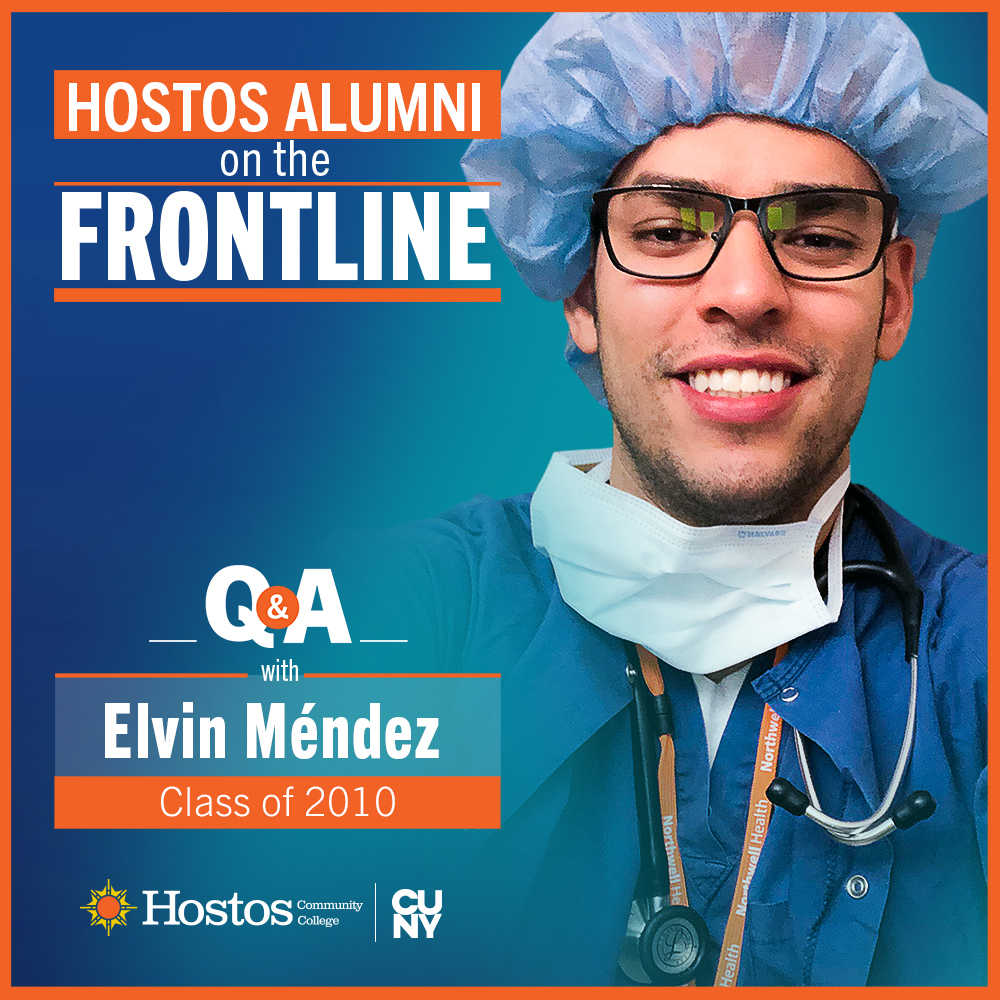
Q & A with Dr. Elvin Méndez , Hostos ’10
Anesthesiology Resident
This interview was conducted on 5/23/2020 by Tanisha L. Ramirez, Communications Publications Writer, and has been edited for length and clarity
Hostos alumnus Dr. Elvin Méndez,’10, is currently working on the frontlines of the COVID-19 pandemic as an anesthesiology resident at Long Island Jewish Medical Center and Northshore University Hospital. With scheduled elective operations on pause in New York, he was redeployed to the Intensive Care Unit (ICU), where he helps care for patients in critical condition. The College caught up with him to learn about his experiences as a healthcare worker during these unprecedented times.
Q: What does your occupation typically require you to do?
A: As an anesthesia physician you work in multiple settings either in the hospital or outpatients facilities. We provide anesthesia for patients undergoing surgery as well as those needing less invasive procedures such as endoscopies/colonoscopies. We also perform emergency intubations in the hospital for patients who decompensate, for example those who develop cardiac arrest. We perform various procedures including: nerve blocks, spinals & epidurals, and central line placements.
Q: What type of work have you been doing during the COVID-19 pandemic?
A: When the COVID pandemic started, all of the elective OR cases were canceled to prevent further spread of the virus and I was redeployed to the Intensive Care Unit (ICU). Here I provide medical care for our sickest patients in the hospital. These are patients that required breathing tubes and medications to support their blood pressure. They have the most severe manifestation of the disease. I also work in the ORs in the event of any emergency surgeries, whether those patients are COVID-positive or not. Additionally, I also assist in performing floor intubations for decompensating patients.
Q: How has your job and role during the crisis impacted you—personally, professionally, emotionally, physically?
A: From a personal and emotional standpoint, seeing patients that had passed away, that in my opinion, weren’t supposed to, saddens me. Many of these patients have no major medical problems and are generally in good health. They have families that they’re leaving behind because of this disease. Also, many of the patients who pass away do so without family by their side since they are not allowed to visit during these times. As a physician, being exposed to something like this is unlike anything I have ever encountered. I am learning how to care for the sickest patients, but also realizing the limitations and challenges that can arise from that. Working during this pandemic has been overwhelming at times not only because of the poor prognosis many of the patients I directly care for have, but also because of the constant threat of contracting the virus myself. Additionally, distancing myself from friends and family has emotionally impacted me as they are my support system. On a positive note, I have been overwhelmed with the comradery and care I have witnessed at work by the entire healthcare team. Everyone is trying their best in this difficult situation and many healthcare providers have volunteered to work in areas new to them. I am also grateful for the support and positive encouragement I have received from patients’ families and the surrounding community. We do give families the opportunity to speak to their loved ones through video chat, and their thank you(s) and encouraging words have personally help me cope with everything.
Q: Please share your message to the Hostos graduates during these difficult times.
A: Challenging times require us to adapt, but do not let this pandemic stop you from pursuing your life goals. Keep moving forward, keep working hard, don’t give up, and stay safe. We will get through this together. Congratulations Class of 2020!
This Q&A has been edited for style and length.